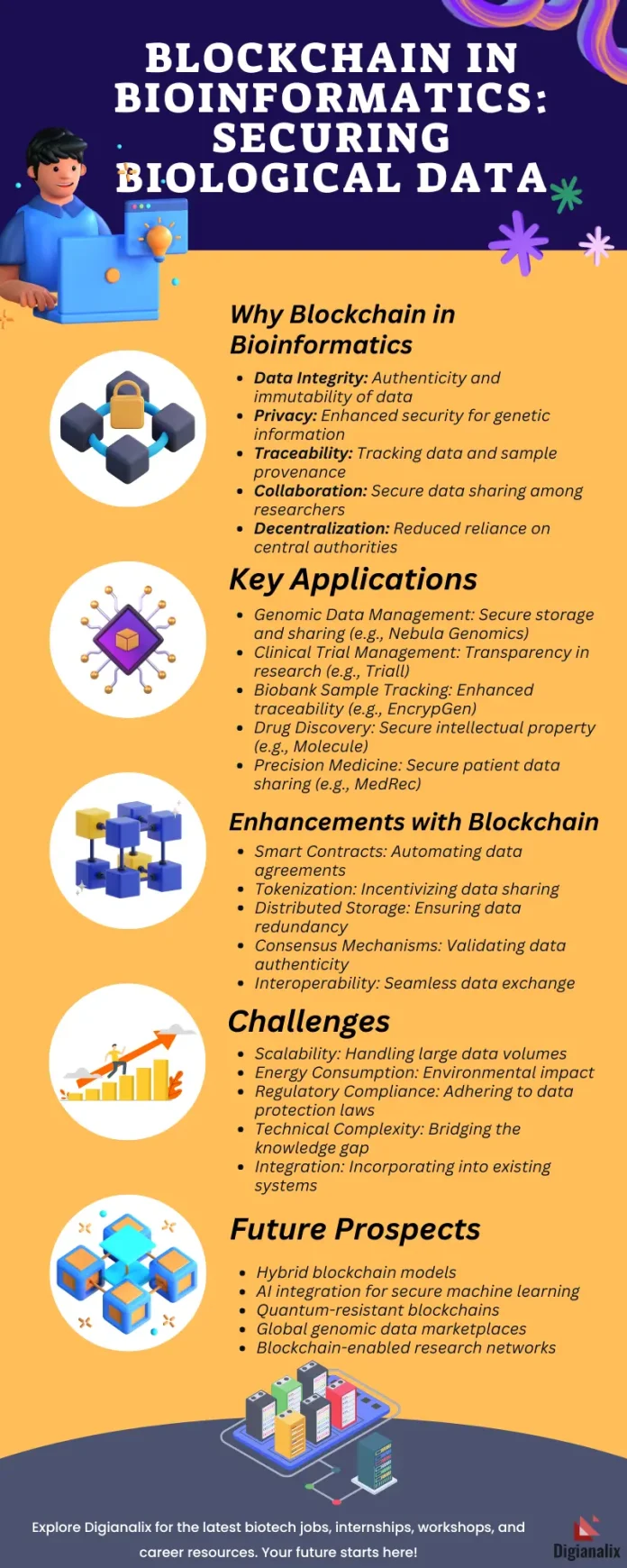Hey there, tech-savvy biologists and data enthusiasts! 👋 Ready to explore how blockchain is revolutionizing the world of bioinformatics? Let’s dive into this cutting-edge intersection of distributed ledger technology and biological data management!
🧬 Why blockchain in bioinformatics?
Blockchain technology is making waves in various industries, and bioinformatics is no exception. But why is it such a game-changer? Let’s break it down:
- Data integrity: Making sure biological data are authentic and immutable.
- Privacy: It enhances the security of sensitive genetic information.
- Traceability: Allow for the origin of data and samples to be traced.
- Collaboration: Allows for secure data sharing among researchers.
- Decentralization: Less reliance on central authorities for data management.
🚀 Key applications of blockchain in bioinformatics
- Genomic data management
- Secure storage and sharing of personal genomic data.
- Example: Nebula Genomics using blockchain for privacy-preserving genomic analysis.
- Clinical trial management
- Increase in transparency and data integrity of the clinical research itself.
- Real-world use: Triall platform for blockchain-enabled clinical trials.
- Biobank sample tracking
- Advanced traceability of biological samples.
- Innovation: EncrypGen’s blockchain-based biobank management system.
- Drug discovery and development
- Securing intellectual property and facilitating collaboration.
- Case study: Molecule’s blockchain platform for decentralized drug development.
- Precision medicine
- Enabling secure sharing of patient data for personalized treatments.
- Breakthrough: MedRec project for blockchain-based medical record management.
💡 How blockchain enhances bioinformatics
- Smart contracts: Automating data access and usage agreements
- Tokenization: Incentivizing data sharing and contribution
- Distributed storage: Ensuring redundancy and availability of large datasets
- Consensus mechanisms: Validating the authenticity of biological data
- Interoperability: Facilitating seamless data exchange between different platforms
🔬 Challenges and considerations
While promising, blockchain in bioinformatics faces some hurdles:
- Scalability: Handling large volumes of biological data
- Energy consumption: Addressing the environmental impact of blockchain networks
- Regulatory compliance: Ensuring adherence to data protection laws (e.g., GDPR)
- Technical complexity: Bridging the knowledge gap for widespread adoption
- Integration with existing systems: Seamlessly incorporating blockchain into current bioinformatics workflows
🔮 Future Prospects
Exciting developments on the horizon include:
- Hybrid blockchain models: Combining public and private chains for optimal performance
- AI integration: Leveraging blockchain for secure, decentralized machine learning in bioinformatics
- Quantum-resistant blockchains: Preparing for the era of quantum computing
- Global genomic data marketplaces: Creating secure platforms for buying and selling genomic data
- Blockchain-enabled biomedical research networks: Fostering international collaboration
💼 Emerging career opportunities
Interested in this field? Consider these roles:
- Blockchain developer specializing in bioinformatics
- Bioinformatics data security specialist
- Blockchain compliance officer for biotech companies
- Decentralized application (DApp) designer for genomic platforms
- Blockchain consultant for biomedical research institutions
🤔 What’s your take?
Are you excited about the potential of blockchain in bioinformatics? What challenges do you foresee? Share your thoughts in the comments below!
Stay at the forefront of this exciting field by subscribing to our site. Let’s explore how blockchain can secure and revolutionize the future of biological data together!




